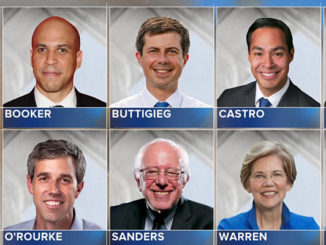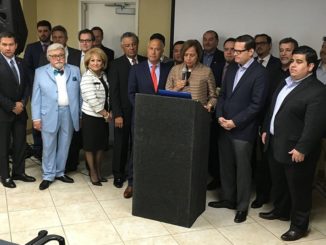
by Alex Gonzalez
There are very important numbers Latinos in the Southwest need to keep track after the election tomorrow. Those number range from Latino turnout nationally and state-by-state, the number of Latinos elected to state legislatures—Democrats and Republicans, the number of Latinos elected to Congress, and how Latino turnout can shape the Congressional races for the House and the Senate. So these are the things we will be watching:
Turnout: tough some have played down the significance of the Latino vote, and presume the Latino vote will be less than it was in 2008, it is expected that 12.5 million of Latinos will cast their vote this election. In 2008, 9.7 million of Latino cast their vote. If indeed this election the Latino vote reaches the 12.5 million, both parties will be forced to allocate more fund for outreach since Latinos will become 11% of the electorate nationally, and thus, force both parties to reconfigure the Electoral map around the Latino vote for next election; the Latino vote will keep growing exponentially each election cycle the while “white” vote get smaller, and hence the need to build winning coalitions by incorporating Latinos.
Who will get the Latino vote: Mitt Romney needs a minimum combined 40% of the Latino vote from 4 states —Florida, Nevada, Colorado, and New Mexico to get 270 Electoral. Any lost of these states, especially Florida’s 29 Electoral Votes, or a defeat in Nevada and Colorado, will leave Romney with only a 25% of the Latino vote. If Romney gets less than the 30% that John McCain received in 2008, it will put Republicans in the uncomfortable predicament of how reconcile differences with older “white” Tea Parties, and “white “blue collar while making the party appealing to Latinos who tend to be younger and more open to immigration and education policies. Currently, the latest poll shows Obama with 70% favorability over Mitt Romney at 25%. If these percentages hold for the election, Democrats will feel embolden to mobilize to get more Latinos registered to vote in traditional red states like Texas and Arizona.
 Latino Vote by State: the Latino vote was already significant—more than 20% of state’s registered voters– in states like New Mexico, California, and Texas. As a result, a high turnout in these states can help elect more Latinos candidates to their respective legislatures, and consequently, push legislatures to tackle issues important to Latinos. Also, a high Latino turnout will make it difficult for a legislators to entertain ideas of introducing bill like SB1070, Voter ID, and “Sanctuary” Bill, and instead, focus on education, and jobs as it has been the case in New Mexico. Essentially, a high turnout makes it difficult for any politicians, including a Latino ones, to keep toying the issue of immigration.
Latino Vote by State: the Latino vote was already significant—more than 20% of state’s registered voters– in states like New Mexico, California, and Texas. As a result, a high turnout in these states can help elect more Latinos candidates to their respective legislatures, and consequently, push legislatures to tackle issues important to Latinos. Also, a high Latino turnout will make it difficult for a legislators to entertain ideas of introducing bill like SB1070, Voter ID, and “Sanctuary” Bill, and instead, focus on education, and jobs as it has been the case in New Mexico. Essentially, a high turnout makes it difficult for any politicians, including a Latino ones, to keep toying the issue of immigration.
Moreover, a high turnout in New Mexico in favor of democrats will force Susana Martinez to abandon the issue of driver licenses for undocumented workers next session while keeping her conservative messages on education. In Arizona, a high turnout will prevents the legislature to reconsider its views on immigration, and especially bills like 1070. Latinos may even shift the balance in the US Senate on the issue of immigration by voting again Republican Jeff Flake. When 1070 was passed, Latinos were only 11% of state’s registered voters. Now it may be up to 16%.
In Texas, the Republican Party may able to hold to its current 5 Latino Republican seats in the House–and the Congressional seat of Dist 23 of “Quico” Canseco. But if not, it will force the GOP to reconsider its approach to woo Latinos; losing these seats will be detrimental for the state GOP image with Latinos since some of these Republicans Latino have become the PR image for the Republican Party on how the GOP is successfully wooing Latinos. Losing these seats will encourage Democrat to attempt to turn Texas blue within the next two elections by registering more Latino voters. Only 4 of these legislators are running for reelections but only 3 have realistic chance to get reelected, including Lozano who change from Democrat to Republican. However, 2 other Republicans—Lozano, Villalba, and Pineda—have real chance to get elected. Consequently, the House may end with 4-5 Republicans. Thus, this election, it is more about keeping Latinos that the GOP has rather than expanding the Latino base.
In California, with the new redistricting and open ballot system, congressional districts are now more competitive. This might open the state for Republican candidates in traditionally blue districts for Congress and the legislature. Also, in state where 22% of the state’s registered voters are Latinos and where only 29.7% of registered voters are Republicans, it will be interesting to see the California GOP can implement a greater afford to woo Latinos voters—CA has 18,000,000 registered voter.
The House on the Senate: a large Latino turnout in Nevada, Arizona, New Mexico, and Texas will shape how Senators will vote in the senate. Senators are well aware of the coalition of voters that elects them. Thus, the balance of power in the US Senate can also be shaped by few Senators from states with high concentration of Hispanic voters.
In the House, currently there are 29 Hispanic members in the House, 5.7% of the total membership. 21 are Democrats (including 2 Delegates), 8 are Republicans. The eyes will be on whether Republicans can elect more Mexican-American from the southwest—Abel Maldonado—and keeping “Quico” Canseco who got elect as Tea Party opposing the Dream Act. The GOP is attempting to broadens it Latino base, away from electing Cuban only. The exit poll will also say what issue were the most important to Latinos.
Issues: both parties will pay attention to issues Latino voted on this election. Any efforts to woo Latinos will be developed around the issues Latinos considered the most important when they voted.
So keep your eyes open, there are lots of numbers we need to be aware to enhance the clout of the Latino vote.
Alex Gonzalez is a political Analyst and Political Director for Latinos Ready To Vote. Comments to [email protected] or @AlexGonzTXCA



